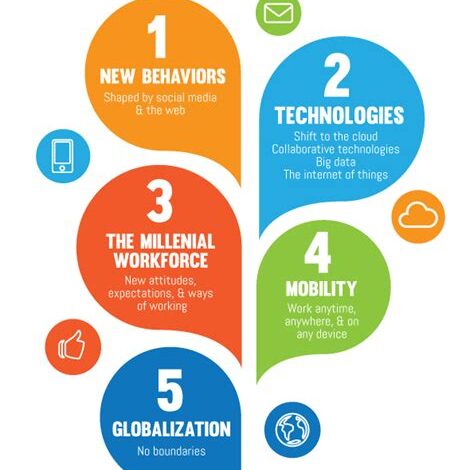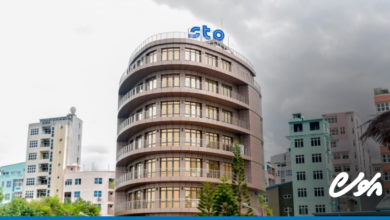Trends Shaping the Future of Work

Discover the benefits of remote work, flexible schedules, automation, AI, and the gig economy. Learn how soft skills play a crucial role in today’s workforce.In today’s rapidly evolving work environment, several trends are shaping the future of how we work. From the rise of remote work to the increasing emphasis on soft skills, the way we approach our careers is undergoing a significant transformation. In this blog post, we’ll explore the key trends that are influencing the future of work and what this means for employees and businesses alike. From the flexibility offered by remote work and flexible schedules to the impact of automation and artificial intelligence on job roles, we’ll delve into how these changes are redefining the workplace. Additionally, we’ll examine the growing prevalence of the gig economy and the importance of honing soft skills in a technology-driven world. Join us as we unpack the trends that are shaping the future of work and consider how these developments may impact your own professional journey.
Remote Work
Remote work has become an increasingly popular trend in the modern workplace. With advancements in technology and the ability to connect with colleagues and clients from anywhere in the world, more and more companies are embracing the concept of allowing their employees to work remotely. This flexibility in work location has opened up opportunities for individuals who may not be able to commute to a physical office, whether for health reasons, family commitments, or personal preference.
One advantage of remote work is the flexibility it provides. Employees are able to create their own schedules and work at times that are most productive for them. This can lead to increased job satisfaction and a better work-life balance. Additionally, remote work can also result in cost savings for both employees and employers, as there is no longer a need for expensive office space and commuting expenses.
However, remote work also comes with its own set of challenges. It can be difficult for some individuals to stay motivated and focused without the structure of a traditional office environment. Additionally, communication and collaboration can be more challenging when team members are not physically present. Employers must also ensure that remote workers still feel connected to the company culture and are provided with the necessary support and resources to be successful in their roles.
Flexible Schedules
Flexible schedules are becoming increasingly popular in the workplace as companies recognize the importance of work-life balance. Employees are no longer expected to adhere to traditional 9-5 hours, but instead have the freedom to choose when they work, as long as they meet their deadlines and deliver results. This shift towards flexible schedules has been largely driven by the demand for a more accommodating work environment, where employees can better manage their personal lives while still excelling in their professional roles.
With the rise of remote work and digital communication tools, employees are able to work from anywhere at any time, making rigid schedules obsolete. This flexibility has been shown to increase job satisfaction and productivity, as individuals are able to work during their most productive hours and accommodate personal commitments without feeling stressed or overwhelmed.
Employers are also recognizing the benefits of offering flexible schedules, as it allows them to attract and retain top talent, reduce overhead costs associated with office space, and create a more inclusive and diverse workforce. As the future of work continues to evolve, flexible schedules will undoubtedly play a pivotal role in shaping the way we approach work-life harmony.
Automation and Artificial Intelligence
Automation and artificial intelligence are two of the most significant trends shaping the future of work. With advancements in technology, many routine and repetitive tasks can now be automated, freeing up time for employees to focus on more complex and value-adding activities. This not only increases efficiency, but also allows workers to cultivate new skills and take on more challenging responsibilities.
Furthermore, artificial intelligence has the potential to revolutionize various industries by streamlining processes, predicting trends, and providing valuable insights through data analysis. This can lead to better decision-making, improved productivity, and enhanced customer experiences.
However, the rise of automation and artificial intelligence also brings about concerns regarding job displacement and the future of work. As certain tasks become automated, there is a growing need for employees to upskill and reskill in order to remain relevant and competitive in the job market. Companies must also navigate ethical considerations and ensure that technology is utilized responsibly and ethically.
Gig Economy
The Gig Economy refers to a labor market characterized by the prevalence of short-term contracts or freelance work as opposed to permanent jobs. With the rise of technology and digital platforms, more people are now able to take on “gigs” or temporary work assignments, allowing for greater flexibility and autonomy in their career choices.
One of the key drivers of the Gig Economy is the advancement of communication and payment technologies, which have made it easier for individuals to connect with potential clients or customers and receive compensation for their services. This has opened up a wealth of opportunities for people in various industries, from graphic design and writing to transportation and home services.
However, the Gig Economy also raises questions about job security, benefits, and labor rights, as many individuals in this type of work may not have access to traditional employment benefits such as health insurance or retirement plans. It has also sparked discussions about the need for updated labor laws and regulations to address the challenges and opportunities presented by this evolving work model.
Emphasis on Soft Skills
In today’s rapidly changing work environment, the emphasis on soft skills has never been more important. With the rise of automation and artificial intelligence, the demand for employees with strong interpersonal and communication skills is on the rise. Employers are placing a greater importance on the ability to work well in teams, adapt to change, and effectively communicate with clients and colleagues.
Soft skills such as leadership, problem-solving, and emotional intelligence are becoming a crucial factor in determining a candidate’s suitability for a position. In the past, technical skills were the primary focus when hiring, but now employers are realizing the value of employees who can effectively lead, collaborate, and manage conflicts in the workplace.
As the workplace continues to evolve, the ability to navigate through complex situations, build strong relationships, and demonstrate empathy and understanding are essential for success. In a world where technology is constantly advancing, the value of soft skills cannot be overstated.





